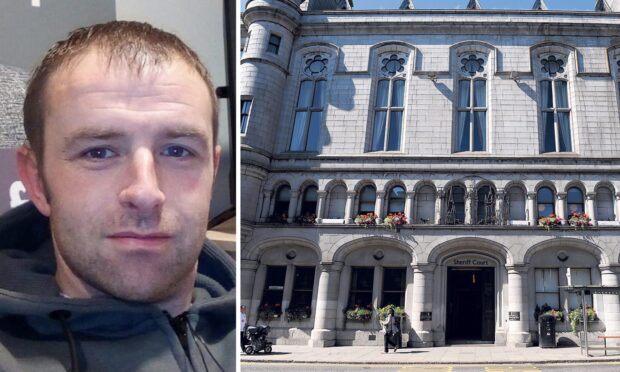A tradesman who “preyed” on vulnerable pensioners to scam them out of nearly £30,000 has been jailed.
George Flannigan took advantage of the “trusting nature” of three Buckie residents in their 80s to pocket cash by grossly overcharging them for work.
Alistair and Elizabeth Moir, who were 87 and 83 at the time, were duped into parting with £28,800 for the shoddy work done to their roof – which was valued by an independent surveyor at £5,000.
The couple were then forced to fork out an additional £8,500 to put right the damage that had been done to their home.
Moray tradesman who scammed pensioners only raises half the money required
Yesterday, 24-year-old Flannigan was jailed for 15 months after Elgin Sheriff Court he was only able to pay back less than half of what he conned from his victims.
Sheriff Chris Dickson condemned Flannigan, from Fife, for “targeting” vulnerable residents.
Defence agent Kate Phillips had earlier revealed her client already has a previous conviction for a similar offence.
Last night Detective Constable Frank McDermott, who led the investigation, described the Flannigan’s actions as “deplorable”.
He said: “Flannigan preyed on people’s good and trusting natures, making them believe he was working in their best interest.
“The reality is the repairs were never required and Flannigan left victims financially and emotionally devastated.”
Flannigan worked on the Moirs’ home between February and May 2016. During that time he recruited a team of six men to do the work while persuading the couple that more repairs were required. He has now paid back £11,000 to the family.
During the same period, he also convinced dementia sufferer Mary Ritchie that her chimney needed repaired.
He tried to charge the then 82-year-old £8,000, but two cheques she gave him bounced.
Yesterday, Moray Council’s trading standards team revealed suspicion fell upon Flannigan’s enterprise, Re-Roofs Scotland, because they advertised an address in the region they knew to be “false”.
Jim Grant, head of the council’s development services, said: “Residents contracted Flannigan following cold call visits to their property. We continue to urge residents not to have work done as the result of this kind of cold calling by tradesmen.”
Mrs Phillips said her client was “remorseful” about the distress caused to his victims – explaining he had taken on jobs that were “too big” for him.
She said: “He had recently decided to go into business on his own after working for the family firm. He had six men working on one job and five on the other, who would obviously need paid too.
“He accepts now that he shouldn’t have charged as much as he did.”
Sheriff Dickson added: “These are extremely serious offences, aggravated by the fact that you have targeted vulnerable victims.”
Flannigan, who lives in a static home at Cartmore Industrial Estate in Lochgelly, was jailed after admitting a charge of fraud and another of attempted fraud.
Raising awareness of bogus callers and rogue traders
Police across Scotland are currently running a two-week operation to raise awareness of bogus callers and rogue traders.
Between April and September last year, 336 victims of doorstep crime were conned out of about £420,000 across the country.
Nearly 80% of those who lost money were of pensionable age.
Yesterday, officers said offenders would will usually claim to be from a utility company or charity in order to gain access from homes to steal.
Chief Superintendent John McKenzie said: “These criminals can be very plausible and persuasive and it can be easy to be taken in by them.
“The most vulnerable in our society do continue to be the main target for these fraudsters and I would urge people to look out for their elderly, or otherwise vulnerable, friends.
“Bogus callers and rogue traders will unfortunately be found on a street near you but together we can bring down their criminal enterprise and keep our communities safe.”
People suspicious about callers to their door have been advised to check their identity with a third party, or use a door chain to prevent them getting access to homes. Anyone who feels scared or intimidated should call 999.










